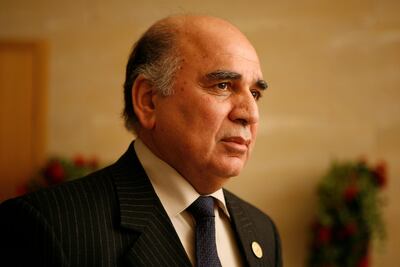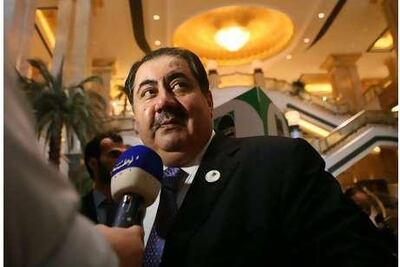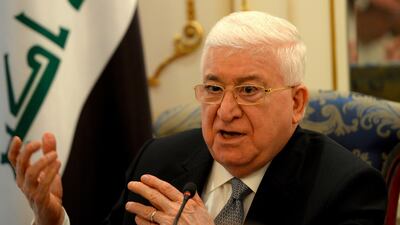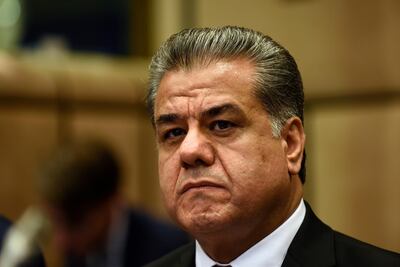Iraqi political leaders are racing to form the next government and, while a Shiite will take the premiership, the country’s most powerful position, negotiations are now under way for another top post – the presidency.
Sources in Baghdad say that it is highly likely that the next president will be a member from the Kurdistan Democratic Party, but discussions are still ongoing.
Ghazi Al Yawar was appointed as Iraq’s first president under the interim government from 2004-05. The Sunni Arab politician is from Iraq’s Shammar tribe, considered to be one of the most important in the country.
Mr Al Yawar was replaced by Jalal Talabani, a Kurd from the Patriotic Union of Kurdistan, who held the presidency for nearly a decade after the fall of former dictator Saddam Hussein.
He was considered a rare unifying figure among Iraq’s various factions.
Mr Talabani used his time in office to act as a chief executive to skilfully bridge relations between Baghdad and Erbil, capital of the Kurdistan Regional Government. He was the first non-Arab to hold the role until 2014, two years after he suffered a stroke. He passed away in Germany in October 2017 after his health deteriorated.
_________
Read more:
Iraqi parliament to convene first session on September 3
Iraq's Maliki sidelined as Kurds and Sunnis seek Sadr coalition
Iraq's Maliki seeks long-shot political comeback by courting Kurds
Is Al Sadr's alliance with Iran-backed coalition a setback for Iraq?
__________
Although the post is largely ceremonial, there are some powers that are given to the president, Renad Mansour, senior research fellow at London's Chatham House told The National.
“The president should be respected, fair and to some extent an arbitrator between Iraq’s different groups. Administrative and ceremonial functions are given to the president that he must carry out,” Mr Mansour said.
The president will be Iraq's representative in the Arab League, but also the Kurdish representative in Baghdad, Michael Knights, a senior fellow at the Washington Institute for Near East Policy told The National.
“They need to have an experience of Arabic culture and excellent Arabic fluency, suggesting an older person, and they need to have strong relationships in Baghdad and a good understanding of the constitution, in order to lead day-to-day Baghdad-Kurdistan negotiations,” Mr Knights said.
Article 74 of the Iraqi constitution stipulates that the president must be more tha 35 years of age and have a college degree or its equivalent.
In 2014, the parliament voted to approve Fuad Masum as president, along with Mr Talabani, he founded the PUK in 1975. Known as a staunch opponent of Saddam Hussein, Mr Masum helped to draft the new Iraqi constitution after the US-led invasion in 2003.
He was seen as a legislator, a placeholder and someone who could work in Baghdad.
“Talabani was much more prominent in his speeches and his acts, and a vocal leader, whereas Masum acted more of an administrator working behind the scenes and taking a back seat on many issues,” Mr Mansour said.
For more than a decade, an informal agreement was held whereby Iraq’s president is a Sunni, its prime minister is a Shiite, and speaker of its parliament is a Sunni.
Potential presidency candidates:
Fuad Hussein is a very close associate to former President of the Kurdistan Regional Government, Masoud Barzani, according to Mr Mansour.
Currently, Mr Hussein serves as the chief of staff for the Kurdistan Region Presidency and is regarded as a highly likely candidate for the position.

Fazil Mirani is the secretary general of the KDP political bureau and is known to be one of the highest-ranking officials in the party.
He took office in 2005 and has been known to reconcile relations between Baghdad and Erbil.
Hoshyar Zebari, a former Iraqi foreign and finance minister and senior adviser to the Kurdistan Regional Government, helped to lead the Kurdish referendum.

Yet by heading the referendum commitee Mr Zebari will face some backlash, Mr Mansour said, as the president must ensure that relations between Baghdad and Erbil remain strong and stable.
He was born in 1953 in the Kurdish town of Aqrah, but grew up in the Iraqi city of Mosul. The official is a graduate of Essex University in Britain.
Falah Mustafa is the head of the Department of Foreign Relations for the KRG. He is considered an ideal candidate because of his diplomatic background. Born in 1964, Mr Mustafa graduated from the University of Bath in 1995.



